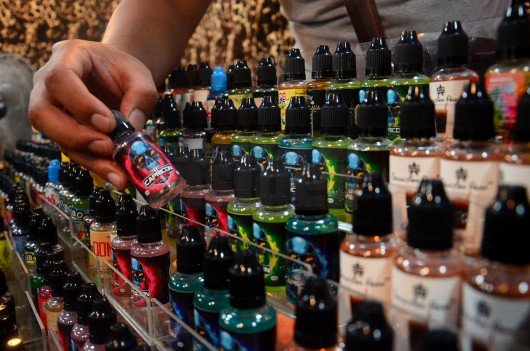Vaping has been at the core of many discussions lately (with respect to the Paris attacks), be it in the news, on air, online, or even your local kopitiam. There are mixed opinions about it, with some groups calling for an outright ban on the vaporisers and its related products, while others suggest strict regulations for its sale.
After all, one man’s meat is another man’s poison.
So, when did the vaping trend start? E-cigarettes, or ‘vape’ products, have only been introduced in the country for about 7 to 10 years. However, according to the Malaysian E-Vaporisers and Tobacco Alternative Association (Mevta), there are now approximately 1 million e-ciggarette consumers in Malaysia, and the vape industry has generated some RM2 billion in revenue. There are more than 1,000 vape shops and vaping outlets in the country offering about 400 local brands of e-vaporisers and “juice” (nicotine infused liquids).
That’s pretty amazing for a business, or industry, to flourish so well in less than a decade. Well, consider this, then: Malaysia is now the second biggest market in the world for vape after the United States.
Put into perspective, that’s a pretty astounding statistic.

E-ciggs or vaping is now a multi-million ringgit industry in Malaysia. Vaping products are now locally made with a variety of flavours and models, and cost little to maintain. – The Malaysian Insider pic, October 4, 2015.
Rural and Regional Development Minister Datuk Seri Ismail Sabri Yaakob had drawn much flak and incredulous outcries earlier this month for urging young local vape entrepreneurs to expand their business and make Malaysia famous for vape flavours on the global stage. Considering the controversy surrounding it, it was probably not the best time or idea to bring up at that moment. Many people, including experts in the medical field, condemned the very notion, pointing out that it was a very shallow aspect to view the issue from, as the short-term benefits from the ‘fame and fortune’ gained from expanding this fledgling industry would be greatly overshadowed by the long-term health problems and social ills further down the line, if no proper action or research was carried out.
As with any other controversial issue in Malaysia, vaping has become a topic of debate among people, both offline and online. However, the interesting thing about this particular issue is that the line between right and wrong, yes and no, is very much blurred. Listening to both sides of the argument, you’d have to agree that both parties bring up good points to support their stance.
One morning on the way to work this week, I was listening to the radio where they were talking about this exact same topic, and several listeners called in to give their take on the issue. The first person who called in was of the opinion that vaping should be banned completely, as it posed a health risk not only to users, but also to people – especially children – who were nearby and inhaled the secondhand smoke. She was especially against people who used their vaporisers indoors.
The next caller through was a man, who said that as a (former) smoker who had used both the conventional cigarettes and vaporisers, he agreed with the notion of having strict regulations in place for e-cigarettes and vapes. He had successfully quit smoking for a while, and found that besides the smell, there was not much difference between conventional smoking and vaping. In his opinion, smokers’ addiction were more a product of peer pressure and being in company of other smokers. Without companions who smoked, he reasoned that many smokers would be able to easily kick the habit.
Former Prime Minister Tun Dr Mahathir Mohamad has also shared his views on the vape issue, saying that vape was equally harmful as cigarettes because of the high nicotine content in the product, and that “the good smell is the way to promote the vape products” because the “juice” (e-fluids) came in many different flavours and scents. Drug addiction is not something new, as evidenced by history. Dr Mahathir pointed out that in the olden days, only rickshaw riders and labourers took opium to ease their tiredness and promote sleep after a hard day’s work, but today, people took drugs because they were addicted. Of course, peer pressure or curiosity about a new trend were also factors that led to people picking up the habit, especially the younger generation.
Personally, as a non-smoker with friends and acquaintances who smoke conventional cigarettes as well as vapes, I feel that it would be in everyone’s interest to adopt the same (or at least similar) rules and regulations for both forms of smoking. After all, e-cigarettes have been found to be a very effective way for people with cigarette addictions to wean themselves off of smoking, and hopefully quit the habit completely. The problem now is that without proper regulations in place, non-smokers are taking to vaping due to peer pressure, just for fun, or simply to keep up with the latest ‘trend’. And the worst part? Even children no more than teenagers have been caught using these e-cigarettes/vaporisers! This is extremely worrying, as there is little to no information about how vaping can affect health.
So, should vaping be regulated like conventional cigarettes, or should it be banned completely?
For now, authorities are only cracking down on vape stores around the country that sell nicotine-based vapes. Part of the reason is the Poisons Act, which states that products that contain nicotine is subject to strict regulation in Malaysia, along with the fact that many of these stores do not possess a valid licence to sell their products.
Health Minister Dr Subramaniam has said that a ban is still possible in the future, adding that the cabinet fully recognised the health effects of cigarette smoking and vaping. If it adopts the tobacco-like rules, the ministry will ban vaping in areas where it is not allowed to use traditional cigarettes. It may also prohibit the sale of vaping products to minors, and make it illegal for minors to possess vaping products. Areas where vaping may be prohibited will include schools, hospitals, air-conditioned restaurants, offices and cinemas, and on buses, trains and planes. The Health Ministry may also impose other regulations, such as compulsory ingredients listing and limiting the levels of certain flavourings. This is particularly so as it is the flavoured “juices”, or vape fluids, that seem to make e-cigarettes attractive to young people and non-smokers.
British American Tobacco (Malaysia) Berhad, Philip Morris (Malaysia) Sdn Bhd & JT International Tobacco (Malaysia) Sdn Bhd – the ‘Big Three’ of tobacco products in Malaysia – also produce these vaping products, but they have not been introduced in Malaysia yet. They might enter this market once all the regulations are in place. A smart move, considering that opinions and regulations concerning e-cigarettes and vaping are still very much mixed all over the world. For example, Brazil, Singapore, the Seychelles, and Uruguay have banned e-cigarettes, whereas in the United Kingdom (UK) and United States (US), the use and sale of e-cigarettes are legal.
Malaysia would do well to emulate Canada’s stand on vaping, where it is not outright banned, but use of vape juice is closely monitored and those containing nicotine is closely regulated. After all, it is still considered one of the best alternatives to conventional cigarettes. Smokers are encouraged to switch to vaping due to the low nicotine content, which can help them get rid of their addiction to the substance. Anecdotal evidence has proven that the switch to e-cigarettes has helped many heavy smokers to considerably decrease their cigarette addiction, resulting in better health and social lifestyles.
We super like this video from Malaysian YouTuber Jared Lee/TheGRIMFILM. Confirm laugh die you.
*Note: The Malaysian government has not banned vaping, as mentioned in the video.
“To all the smokers who start vaping, I support you.
If you don’t smoke and you vape, I slap you.”
Are you a smoker or non-smoker? What do you think? Feel free to share your thoughts in the comments! 🙂
Edit: We’ve continued our discussion of banning vape in Malaysia in our latest article, plus a list of states that have/have not banned vape products.
Source
New Straits Times Online, ‘Why we should regulate vaping’ (link)
Free Malaysia Today, ‘Isma raps Ismail Sabri for backing vape trade’ (link)
The Malaysian Insider, ‘Groups lodge police report, want ban on vaping’ (link)
Astro Awani, ‘Malaysia should carry out own study on effects of vaping’ – National Poison Centre’ (link)
Astro Awani, ‘Vape, cigarettes equally harmful due to high nicotine content – Dr Mahathir’ (link)
The Star Online, ‘Nationwide raids target nicotine-based vapes’ (link)
Astro Awani, ‘Vaping: I beg to differ,” doctor tells Ismail Sabri’ (link)








